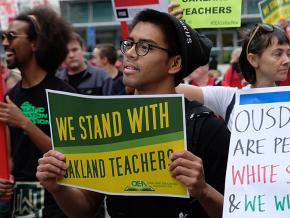Why tech workers should support the teachers
As tech workers, we have an interest in joining with others to fight for better working and living conditions in our communities, write and .
AS BAY Area tech workers and activists, we see clearly that the struggles faced by tech workers are fundamentally connected with those faced by the teachers who are on strike in Oakland.
When one section of the working class fights and wins, it raises the hopes and expectations for all working people. Now that the strike wave that swept through Virginia, Oklahoma, Colorado and Arizona is coming to Silicon Valley’s own backyard, it’s time for us to show up, support the striking teachers and learn from their struggle.
Many of the social and economic forces that are impacting teachers also directly impact tech workers.
The already sky-high cost of housing means that even relatively well-paid tech workers (who are not the majority of tech workers) spend a significant portion of each paycheck on renting a place to live. The striking teachers point out that Oakland rents have increased 32 percent since 2014, and wages have not risen at the same pace.

There are other ways the teachers’ struggle impacts workers in tech. Educators are having a harder time doing their jobs, which means that raising a family in the Bay Area becomes a choice between scrambling for access to better schools or sending the kids to private or charter schools (schools that are run privately but receive state funding).
A lack of quality education also maintains state-sanctioned inequality and segregation. So a teachers’ strike in Oakland is also a racial justice issue, since Oakland is one of the most racially diverse cities in the country. More than 85 percent of students are non-white, and 30 percent are English language learners.
THE DEMANDS of the Oakland Education Association (OEA), the union representing 3,000 educators, include spending more money on students, nurses and counselors; lower class sizes; and a living wage that will keep Oakland teachers in Oakland classrooms.
The Tech Workers Coalition (TWC) is a coalition of workers in and around the tech industry, including labor organizers, community organizers, and friends, in the Bay Area, Seattle, and elsewhere. The TWC issued a statement about the possibility of a strike, which reads in part:
Oakland has the ability and the responsibility to provide excellent public education for all students...The teachers, who make a difference in students’ lives, are the experts — not the consultants, politicians or tech executives — on what they need to provide the learning conditions their students deserve.
In addition to asking for smaller classes, higher wages and more support, teachers in Oakland are demanding that the board of the Oakland Unified School District (OUSD) be held accountable for the $57 million that charter schools cost the district. This means there is $1,500 per year less for each student in non-charter public schools.
“After years of the OUSD board rubber-stamping new charters, 30 percent of Oakland public school students attend charter schools — a higher percentage than any other city in California,” says an OEA pamphlet.
“Since tech billionaires like Netflix CEO Reed Hastings are key players in the push for charter schools,” wrote Eric Blanc, author of the forthcoming book Red State Revolt about the teacher strike wave, “tech workers have a critical — and strategic — role to play in supporting public teachers fighting privatization.”
WHILE THE tech industry is not solely to blame for what’s going on in the Bay Area now, the monied interests that rule the industry bear direct and indirect responsibility for many crucial factors in the situation. Some of the negative things about tech impact striking teachers directly:
There is a growing tech aristocracy that is becoming more explicit. LinkedIn co-founder Reid Hoffman has said that wealth inequality and aristocracy are “broadly a feature of human society, not a bug.” If there has always been and always will be moneyed ruling class, the logic goes, why support things like public education?
Thus, reports the East Bay Times, donations by Hastings, Michael Bloomberg, tech venture capitalist Arthur Rock and the Walton family helped pack the OUSD with pro-charter and pro-private board members.
Companies like Apple, Google, and Facebook keep their money in tax havens overseas (p.s., Oxfam reported that we the people were robbed of $135 billion in 2017; companies don’t want to pay). They spend millions of dollars on lobbyists to keep tax laws in their favor (Apple alone spent $3 million for pro-corporate tax reforms).
Recently, it came to light that because of Trump tax cuts, some companies, including Amazon, GM and Halliburton, owe no taxes at all and may even get a refund. And just like 60 percent of Fortune 500 companies, they filed with the IRS as being housed in Delaware to avoid paying income taxes in the state they actually operate in.
Indirectly, tech’s problems (for example, gender discrimination and racial inequality at Google, Facebook and Apple; pay gaps; war-profiteering by Amazon and Google; the whole Facebook scandal about Russia and Cambridge Analytica) are creating a culture of mistrust and greed that only reinforces a deeply cynical cultural current, of which privatization is just one manifestation.
Even as big tech companies thrive, the public has lost a lot of trust in them. Three quarters of U.S. adults said in 2018 that they trust major technology companies “hardly ever” or only “some of the time.”
Like other tech workers, we know and care a lot about technology and its impacts on the world. If the way we produce technology is harmful, we want to stop that harm. If people don’t trust tech companies, we want to find ways to rebuild trust — if not in the companies themselves, then in us, the ones who actually make the technology.
As thousands of Oakland teachers walk the picket line this month, tech workers of the Bay Area have an opportunity to support them in real, concrete ways.


